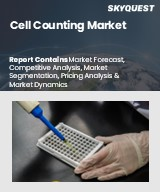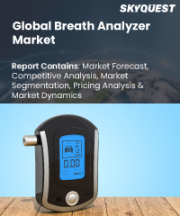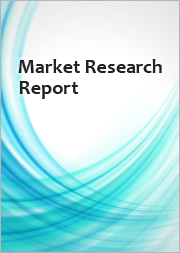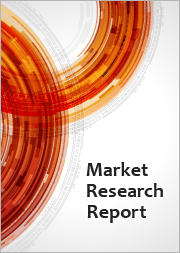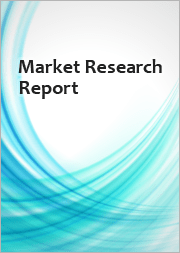
|
시장보고서
상품코드
1802984
처방 앱 컴플라이언스 시장 예측 : 구성 요소별, 운영 체제별, 기능별, 배포 모드별, 최종 사용자별, 지역별 분석(-2032년)Prescription App Compliance Market Forecasts to 2032 - Global Analysis By Component (Software and Services), Operating System (iOS, Android and Windows), Functionality, Deployment Mode, End User and By Geography |
||||||
Stratistics MRC에 따르면 세계의 처방 앱 컴플라이언스 시장은 2025년에 32억 달러를 차지하고 예측 기간 동안 CAGR은 22.6%를 나타내며 2032년에는 133억 달러에 이를 것으로 예상됩니다.
처방 앱 컴플라이언스란 디지털 건강 앱, 특히 처방약을 관리, 추적 및 제제하는 앱이 규제, 법률 및 윤리 기준을 준수함을 의미합니다. 여기에는 FDA, HIPAA, EMA 등의 건강 관리 당국이 환자의 안전, 개인정보 보호 및 데이터 보안을 보호하기 위해 설정한 가이드라인에 앱이 확실히 따르는 것을 포함합니다. 컴플라이언스에는 정확한 처방 관리, 환자 정보의 안전한 보관, 제약 시기 적절한 알림, 약물 상호작용 및 부작용에 대한 적절한 보고 등이 포함됩니다. 높은 기준을 유지함으로써 처방전 애플리케이션은 의료 제공업체와 환자 간의 신뢰를 키우는 동시에 오용 및 규제 위반과 관련된 위험을 최소화합니다.
원격 의료 및 원격 모니터링
원격 의료 및 원격 모니터링은 접근성, 개인화 및 실시간 참여를 강화하여 처방 앱 컴플라이언스에 혁명을 가져옵니다. 이러한 기술은 적시에 알림, 가상 컨설팅, 생체인식 추적을 통해 환자에게 힘을 주고, 복용 누출을 줄이고, 복용 어드밴스를 향상시킵니다. 원격 모니터링은 적극적인 개입을 촉진하고, 원격 의료는 특히 만성 질환 관리에서 케어 갭을 채웁니다. 이들은 모두 디지털 헬스를 일상적인 루틴에 통합하고, 사용자의 정착을 높이고, 프로바이더나 앱 개발자에게 데이터 주도의 인사이트를 가능하게 함으로써, 시장 개척을 추진합니다.
개인정보 보호 및 데이터 보안에 대한 우려
프라이버시와 데이터 보안에 대한 우려는 처방 앱 컴플라이언스 시장 성장에 큰 장벽이 될 것입니다. 환자 및 건강 관리 제공업체는 데이터 유출 및 무단 액세스, 민감한 의료 정보의 악용을 두려워하고 디지털 플랫폼의 채용을 망설일 수 있습니다. 이러한 불신은 앱 사용을 줄이고 원활한 처방 추적을 방해하며 시장 확대를 늦출 수 있습니다. 강력한 보안 조치를 확보하는 것은 여전히 중요한 과제이며 이러한 컴플라이언스 솔루션의 전반적인 채택을 억제합니다.
기술 진보
기술의 진보는 환자 참여의 강화, 복약 추적의 간소화, 실시간 복약 어드레싱 모니터링을 실현함으로써 처방 앱 컴플라이언스 시장에 혁명을 가져왔습니다. AI가 장착된 알림, 스마트 정제 디스펜서 및 통합 EHR 시스템은 개별화된 개입을 촉진하고 컴플라이언스 위반 위험을 줄입니다. 모바일 헬스 플랫폼은 현재 다국어 지원, 게이미 피케이션, 예측 분석을 제공하여 다양한 계층에서 더 나은 결과를 촉구합니다. 이러한 기술 혁신을 통해 의료 종사자는 실용적인 인사이트를 얻을 수 있으며, 컴플라이언스를 수동 작업에서 데이터 중심의 적극적인 건강 관리 전략으로 전환할 수 있습니다.
소규모 진료소에 대한 재무적 영향
소규모 클리닉의 재무 제약은 처방전 컴플라이언스 앱의 채용을 방해하고 시장 침투와 확장성을 제한합니다. 특히 자원이 부족한 클리닉에서는 고액의 초기 비용, 통합 과제, 지속적인 구독료가 투자를 방해하고 있습니다. 이러한 장벽은 디지털 불공평을 악화시키고, 충분한 서비스를 받지 못한 사람들이 어드히어런스 향상 도구를 사용할 수 없는 상태로 남아 있습니다. 시장을 좁히는 보조금이나 확장 가능한 가격 모델이 없으면 농촌과 저소득층에서 정체되어 보다 광범위한 공중보건 가능성을 손상시킬 위험이 있습니다.
COVID-19의 영향
COVID-19의 대유행은 처방 앱 컴플라이언스 플랫폼을 포함한 디지털 건강 솔루션의 채택을 크게 가속화했습니다. 잠금 및 대면 건강 관리 액세스가 제한되는 가운데 환자는 복용 일정 관리, 복용량 추적, 알림 수신 등 점점 더 모바일 앱에 의존하게 되었습니다. 원격 의료의 통합은 더욱 이용을 밀어 올리고 시장 성장을 가속했습니다. 그러나 공급망의 혼란과 규제상의 장애물이 앱의 배포를 일시적으로 지연시켰습니다. 전반적으로 COVID-19는 건강 관리에서 디지털 컴플라이언스 도구의 중요한 역할을 돋보이게 하는 계기가 되었습니다.
예측 기간 동안 복용량 추적 부문이 최대가 될 것으로 예상
복용량 추적 부문은 환자의 복용 어드히어런스를 높이고 투약 실수를 줄이기 때문에 예측 기간 동안 최대 시장 점유율을 차지할 것으로 예측됩니다. 실시간 알림, 개인화된 복용량 알림 및 리필 알림을 제공함으로써 이러한 앱은 사용자에게 복잡한 요법을 쉽게 관리할 수 있는 힘을 제공합니다. 이러한 기능은 사용자의 참여도를 높이고 건강 결과를 개선하며 건강 관리 비용을 절감합니다. 만성 질환의 확산과 모바일 기술의 보급과 함께, 복용량 추적은 컴플라이언스 플랫폼을 환자 중심의 데이터 중심 케어 제공에 필수적인 도구로 바꾸고 있습니다.
예측 기간 동안 약물 상호 작용 경보 분야의 가장 높은 CAGR을 나타낼 것으로 예상
예측 기간 동안 약물 상호작용 경보 분야는 가장 높은 성장률을 나타낼 것으로 예측됩니다. 왜냐하면 이러한 경고는 실시간으로 증거 기반 경고를 사용자에게 제공하고 약물 유해 사건을 줄이고 디지털 플랫폼에 대한 신뢰를 조성하기 때문입니다. AI 주도의 경고를 통합함으로써, 앱은 임상의와 환자를 위한 사전 활동적인 도구가 되어, 치료 성과를 향상시키고, 투약 실수를 최소화합니다. 이 부문의 확장은 정확성, 안전성 및 사용자 참여를 선호하는 지능적이고 컴플라이언스 중심의 건강 관리 생태계로의 광범위한 변화를 반영합니다.
최대 점유율을 차지하는 지역 :
예측 기간 동안 아시아태평양은 디지털 건강 도입 증가와 복용 어드히어런스의 이점에 대한 의식이 높아짐에 따라 최대 시장 점유율을 차지할 것으로 예측됩니다. 건강 관리 제공업체는 환자의 처방을 모니터링하고 실수를 줄이고 치료 결과를 높이기 위해 앱을 활용하고 신뢰와 참여를 기르고 있습니다. e헬스 솔루션을 추진하는 정부의 이니셔티브는 AI 주도의 리마인더 등의 기술적 진보와 함께 앱 이용을 더욱 뒷받침하고 있습니다. 이러한 요인은 전체적으로 시장 확대를 촉진하고 이 지역을 처방전 컴플라이언스 혁신의 중요한 기지로 자리매김하고 있습니다.
가장 높은 CAGR을 나타내는 지역 :
예측 기간 동안 북미는 가장 높은 CAGR을 나타낼 것으로 예측됩니다. 이는 의약품 보충을 강화하고 치료 중단을 줄임으로써 환자 중심의 치료로 이동하기 때문입니다. 만성 질환의 확산이 증가함에 따라 이러한 디지털 플랫폼은 실시간 알림, 복용량 추적 및 전자 의료 기록과의 원활한 통합을 통해 사용자에게 힘을줍니다. 이를 통해 건강 결과가 개선될 뿐만 아니라 건강 관리 비용과 병원 재입원도 억제됩니다. 기술 혁신과 규제 당국의 지원에 힘입어 시장은 다양한 환자 집단을 수용할 수 있는 확장 가능한 개인화 솔루션을 추진하고 있습니다.
무료 주문을 받아서 만드는 서비스 :
이 보고서를 구독하는 고객은 다음 무료 맞춤설정 옵션 중 하나를 사용할 수 있습니다.
- 기업 프로파일
- 추가 시장 기업의 종합적 프로파일링(3개사까지)
- 주요 기업의 SWOT 분석(3개사까지)
- 지역 세분화
- 고객의 관심에 응한 주요국 시장 추계·예측·CAGR(주 : 타당성 확인에 따름)
- 경쟁 벤치마킹
- 제품 포트폴리오, 지리적 존재, 전략적 제휴에 기반한 주요 기업 벤치마킹
목차
제1장 주요 요약
제2장 서문
- 개요
- 이해관계자
- 조사 범위
- 조사 방법
- 데이터 마이닝
- 데이터 분석
- 데이터 검증
- 조사 접근
- 조사 자료
- 1차 조사 자료
- 2차 조사 정보원
- 전제조건
제3장 시장 동향 분석
- 성장 촉진요인
- 성장 억제요인
- 기회
- 위협
- 최종 사용자 분석
- 신흥 시장
- COVID-19의 영향
제4장 Porter's Five Forces 분석
- 공급기업의 협상력
- 구매자의 협상력
- 대체품의 위협
- 신규 참가업체의 위협
- 경쟁 기업 간 경쟁 관계
제5장 세계의 처방 앱 컴플라이언스 시장 : 구성 요소별
- 소프트웨어
- 서비스
제6장 세계의 처방 앱 컴플라이언스 시장 : 운영 체제별
- iOS
- Android
- Windows
제7장 세계의 처방 앱 컴플라이언스 시장 : 기능별
- 복약 알림
- 복용량 추적
- 약물 상호작용 경고
- 재처방 관리
- 환자 교육
제8장 세계의 처방 앱 컴플라이언스 시장 : 배포 모드별
- 클라우드 기반
- On-Premise
제9장 세계의 처방 앱 컴플라이언스 시장 : 최종 사용자별
- 환자
- 의료 제공자
- 지불자
- 약국
제10장 세계의 처방 앱 컴플라이언스 시장 : 지역별
- 북미
- 미국
- 캐나다
- 멕시코
- 유럽
- 독일
- 영국
- 이탈리아
- 프랑스
- 스페인
- 기타 유럽
- 아시아태평양
- 일본
- 중국
- 인도
- 호주
- 뉴질랜드
- 한국
- 기타 아시아태평양
- 남미
- 아르헨티나
- 브라질
- 칠레
- 기타 남미
- 중동 및 아프리카
- 사우디아라비아
- 아랍에미리트(UAE)
- 카타르
- 남아프리카
- 기타 중동 및 아프리카
제11장 주요 발전
- 계약, 파트너십, 협업, 합작투자
- 인수와 합병
- 신제품 발매
- 사업 확대
- 기타 주요 전략
제12장 기업 프로파일링
- Medisafe
- Mango Health
- MyTherapy
- Care4Today
- PillPack
- Dosecast
- Round Health
- AdhereTech
- RxMindMe
- MediSafe Project Ltd.
- MedMinder Systems Inc.
- Philips Healthcare
- Omnicell Inc.
- AptarGroup
- Proteus Digital Health
- Walgreens Boots Alliance
- CVS Health
- Express Scripts
- DrFirst
- Mobile Health
According to Stratistics MRC, the Global Prescription App Compliance Market is accounted for $3.2 billion in 2025 and is expected to reach $13.3 billion by 2032 growing at a CAGR of 22.6% during the forecast period. Prescription App Compliance refers to the adherence of digital health applications, particularly those that manage, track, or dispense prescription medications, to regulatory, legal, and ethical standards. It encompasses ensuring that apps follow guidelines set by healthcare authorities, such as the FDA, HIPAA, or EMA, to protect patient safety, privacy, and data security. Compliance involves accurate prescription management, secure storage of patient information, timely reminders for medication intake, and proper reporting of drug interactions or side effects. By maintaining high standards, prescription apps foster trust among healthcare providers and patients while minimizing risks associated with misuse or regulatory violations.
Market Dynamics:
Driver:
Telehealth and Remote Monitoring
Telehealth and remote monitoring are revolutionizing prescription app compliance by enhancing accessibility, personalization, and real-time engagement. These technologies empower patients with timely reminders, virtual consultations, and biometric tracking, reducing missed doses and improving adherence. Remote monitoring fosters proactive interventions, while telehealth bridges care gaps-especially in chronic disease management. Together, they drive market growth by integrating digital health into daily routines, boosting user retention, and enabling data-driven insights for providers and app developers.
Restraint:
Privacy and Data Security Concerns
Privacy and data security concerns pose a significant barrier to the growth of the Prescription App Compliance Market. Patients and healthcare providers may hesitate to adopt digital platforms due to fears of data breaches, unauthorized access, or misuse of sensitive health information. This mistrust can reduce app usage, hinder seamless prescription tracking, and slow down market expansion. Ensuring robust security measures remains a critical challenge, restraining the overall adoption of these compliance solutions.
Opportunity:
Technological Advancements
Technological advancements are revolutionizing the prescription app compliance market by enhancing patient engagement, streamlining medication tracking, and enabling real-time adherence monitoring. AI-powered reminders, smart pill dispensers, and integrated EHR systems foster personalized interventions, reducing non-compliance risks. Mobile health platforms now offer multilingual support, gamification, and predictive analytics, driving better outcomes across diverse demographics. These innovations empower providers with actionable insights, transforming compliance from a passive task into a proactive, data-driven healthcare strategy.
Threat:
Financial Implications for Small Practices
Financial constraints among small practices are hindering adoption of prescription compliance apps, limiting market penetration and scalability. High upfront costs, integration challenges, and ongoing subscription fees deter investment, especially in resource-strapped clinics. These barriers exacerbate digital inequity, leaving underserved populations without access to adherence-enhancing tools. Without targeted subsidies or scalable pricing models, the market risks stagnation in rural and low-income segments, undermining its broader public health potential.
Covid-19 Impact
The Covid-19 pandemic significantly accelerated the adoption of digital health solutions, including prescription app compliance platforms. With lockdowns and limited in-person healthcare access, patients increasingly relied on mobile apps to manage medication schedules, track dosages, and receive reminders. Telemedicine integration further boosted usage, driving market growth. However, supply chain disruptions and regulatory hurdles temporarily slowed app deployment. Overall, Covid-19 served as a catalyst, highlighting the critical role of digital compliance tools in healthcare.
The dosage tracking segment is expected to be the largest during the forecast period
The dosage tracking segment is expected to account for the largest market share during the forecast period as it enhances patient adherence and reducing medication errors. By offering real-time reminders, personalized dosage alerts, and refill notifications, these apps empower users to manage complex regimens with ease. This functionality drives higher engagement, improves health outcomes, and lowers healthcare costs. With rising chronic disease prevalence and mobile tech adoption, dosage tracking is transforming compliance platforms into essential tools for patient-centric, data-driven care delivery.
The drug interaction alerts segment is expected to have the highest CAGR during the forecast period
Over the forecast period, the drug interaction alerts segment is predicted to witness the highest growth rate because these alerts empower users with real-time, evidence-based warnings, reducing adverse drug events and fostering trust in digital platforms. By integrating AI-driven alerts, apps become proactive tools for clinicians and patients alike, improving therapeutic outcomes and minimizing medication errors. This segment's expansion reflects a broader shift toward intelligent, compliance-focused healthcare ecosystems that prioritize precision, safety, and user engagement.
Region with largest share:
During the forecast period, the Asia Pacific region is expected to hold the largest market share due to rising digital health adoption and growing awareness of medication adherence benefits. Healthcare providers are leveraging apps to monitor patient prescriptions, reduce errors, and enhance treatment outcomes, fostering trust and engagement. Government initiatives promoting e-health solutions, coupled with technological advancements such as AI-driven reminders, are further boosting app utilization. These factors collectively drive market expansion, positioning the region as a key hub for prescription compliance innovation.
Region with highest CAGR:
Over the forecast period, the North America region is anticipated to exhibit the highest CAGR, owing to shift toward patient-centric care by enhancing medication adherence and reducing treatment lapses. With rising chronic disease prevalence, these digital platforms empower users through real-time reminders, dosage tracking, and seamless integration with electronic health records. This not only improves health outcomes but also curbs healthcare costs and hospital readmissions. Fueled by tech innovation and regulatory support, the market is driving scalable, personalized solutions across diverse patient populations.
Key players in the market
Some of the key players profiled in the Prescription App Compliance Market include Medisafe, Mango Health, MyTherapy, Care4Today, PillPack, Dosecast, Round Health, AdhereTech, RxMindMe, MediSafe Project Ltd., MedMinder Systems Inc., Philips Healthcare, Omnicell Inc., AptarGroup, Proteus Digital Health, Walgreens Boots Alliance, CVS Health, Express Scripts, DrFirst and Mobile Health.
Key Developments:
In March 2025, The Washington Spirit and CVS Health have announced a historic three-year partnership renewal, marking the first front-of-kit deal in the club's history. This multimillion-dollar agreement underscores a deep commitment to women's sports and community health initiatives, and the partnership will support programs that empower women and improve community health.
In March 2025, Aptar has entered into a renewable energy supply agreement with Mercuria Energy America to support its sustainability goals. This partnership aims to reduce greenhouse gas emissions and provides a more localized source of renewable energy dedicated to Aptar's operations.
In September 2024, Aptar Pharma has entered an exclusive collaboration with Pulmotree to advance the Kolibri(TM) Non-Propellant Liquid Inhaler (NPLI) platform. This partnership aims to enhance targeted lung drug delivery through a breath-triggered vibrating mesh system.
Components Covered:
- Software
- Services
Operating Systems Covered:
- iOS
- Android
- Windows
Functionalities Covered:
- Medication Reminders
- Dosage Tracking
- Drug Interaction Alerts
- Refill Management
- Patient Education
Deployment Modes Covered:
- Cloud-Based
- On-Premises
End Users Covered:
- Patients
- Healthcare Providers
- Payers
- Pharmacies
Regions Covered:
- North America
- US
- Canada
- Mexico
- Europe
- Germany
- UK
- Italy
- France
- Spain
- Rest of Europe
- Asia Pacific
- Japan
- China
- India
- Australia
- New Zealand
- South Korea
- Rest of Asia Pacific
- South America
- Argentina
- Brazil
- Chile
- Rest of South America
- Middle East & Africa
- Saudi Arabia
- UAE
- Qatar
- South Africa
- Rest of Middle East & Africa
What our report offers:
- Market share assessments for the regional and country-level segments
- Strategic recommendations for the new entrants
- Covers Market data for the years 2024, 2025, 2026, 2028, and 2032
- Market Trends (Drivers, Constraints, Opportunities, Threats, Challenges, Investment Opportunities, and recommendations)
- Strategic recommendations in key business segments based on the market estimations
- Competitive landscaping mapping the key common trends
- Company profiling with detailed strategies, financials, and recent developments
- Supply chain trends mapping the latest technological advancements
Free Customization Offerings:
All the customers of this report will be entitled to receive one of the following free customization options:
- Company Profiling
- Comprehensive profiling of additional market players (up to 3)
- SWOT Analysis of key players (up to 3)
- Regional Segmentation
- Market estimations, Forecasts and CAGR of any prominent country as per the client's interest (Note: Depends on feasibility check)
- Competitive Benchmarking
- Benchmarking of key players based on product portfolio, geographical presence, and strategic alliances
Table of Contents
1 Executive Summary
2 Preface
- 2.1 Abstract
- 2.2 Stake Holders
- 2.3 Research Scope
- 2.4 Research Methodology
- 2.4.1 Data Mining
- 2.4.2 Data Analysis
- 2.4.3 Data Validation
- 2.4.4 Research Approach
- 2.5 Research Sources
- 2.5.1 Primary Research Sources
- 2.5.2 Secondary Research Sources
- 2.5.3 Assumptions
3 Market Trend Analysis
- 3.1 Introduction
- 3.2 Drivers
- 3.3 Restraints
- 3.4 Opportunities
- 3.5 Threats
- 3.6 End User Analysis
- 3.7 Emerging Markets
- 3.8 Impact of Covid-19
4 Porters Five Force Analysis
- 4.1 Bargaining power of suppliers
- 4.2 Bargaining power of buyers
- 4.3 Threat of substitutes
- 4.4 Threat of new entrants
- 4.5 Competitive rivalry
5 Global Prescription App Compliance Market, By Component
- 5.1 Introduction
- 5.2 Software
- 5.3 Services
6 Global Prescription App Compliance Market, By Operating System
- 6.1 Introduction
- 6.2 iOS
- 6.3 Android
- 6.4 Windows
7 Global Prescription App Compliance Market, By Functionality
- 7.1 Introduction
- 7.2 Medication Reminders
- 7.3 Dosage Tracking
- 7.4 Drug Interaction Alerts
- 7.5 Refill Management
- 7.6 Patient Education
8 Global Prescription App Compliance Market, By Deployment Mode
- 8.1 Introduction
- 8.2 Cloud-Based
- 8.3 On-Premises
9 Global Prescription App Compliance Market, By End User
- 9.1 Introduction
- 9.2 Patients
- 9.3 Healthcare Providers
- 9.4 Payers
- 9.5 Pharmacies
10 Global Prescription App Compliance Market, By Geography
- 10.1 Introduction
- 10.2 North America
- 10.2.1 US
- 10.2.2 Canada
- 10.2.3 Mexico
- 10.3 Europe
- 10.3.1 Germany
- 10.3.2 UK
- 10.3.3 Italy
- 10.3.4 France
- 10.3.5 Spain
- 10.3.6 Rest of Europe
- 10.4 Asia Pacific
- 10.4.1 Japan
- 10.4.2 China
- 10.4.3 India
- 10.4.4 Australia
- 10.4.5 New Zealand
- 10.4.6 South Korea
- 10.4.7 Rest of Asia Pacific
- 10.5 South America
- 10.5.1 Argentina
- 10.5.2 Brazil
- 10.5.3 Chile
- 10.5.4 Rest of South America
- 10.6 Middle East & Africa
- 10.6.1 Saudi Arabia
- 10.6.2 UAE
- 10.6.3 Qatar
- 10.6.4 South Africa
- 10.6.5 Rest of Middle East & Africa
11 Key Developments
- 11.1 Agreements, Partnerships, Collaborations and Joint Ventures
- 11.2 Acquisitions & Mergers
- 11.3 New Product Launch
- 11.4 Expansions
- 11.5 Other Key Strategies
12 Company Profiling
- 12.1 Medisafe
- 12.2 Mango Health
- 12.3 MyTherapy
- 12.4 Care4Today
- 12.5 PillPack
- 12.6 Dosecast
- 12.7 Round Health
- 12.8 AdhereTech
- 12.9 RxMindMe
- 12.10 MediSafe Project Ltd.
- 12.11 MedMinder Systems Inc.
- 12.12 Philips Healthcare
- 12.13 Omnicell Inc.
- 12.14 AptarGroup
- 12.15 Proteus Digital Health
- 12.16 Walgreens Boots Alliance
- 12.17 CVS Health
- 12.18 Express Scripts
- 12.19 DrFirst
- 12.20 Mobile Health






